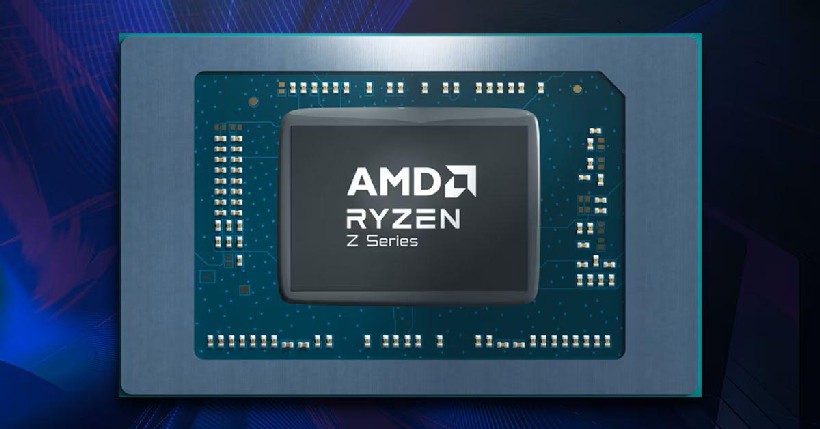AMD at CES 2025: Ryzen AI MAX APUs announced on Zen 5 and RDNA 3.5, Ryzen Z2 and Ryzen 9000HX
10.01.25
AMD has officially announced the Ryzen AI MAX APU series under the Strix Halo brand, equipped with Zen 5 and RDNA 3.5 architectures. The company also introduced the new Ryzen Z2 processors, specially designed for portable game consoles, and the new Ryzen 9000HX processor series, designed for gaming laptops.
AMD Ryzen AI MAX (Strix Halo): APU with Zen 5 and RDNA 3.5 for mobile systems
AMD has officially announced the Ryzen AI MAX APU series under the Strix Halo brand, equipped with Zen 5 and RDNA 3.5 architectures. These chips provide excellent performance thanks to integrated graphics that outperform many budget GPUs.
The series will be released in two versions: PRO for business laptops and workstations, as well as a consumer version. Both versions will be available in configurations with up to 16 Zen 5 cores and up to 40 RDNA 3.5 compute units.
The flagship Ryzen AI MAX+ (PRO) 395 processor features 16 cores with a clock speed of up to 5.1 GHz, 80 MB of cache and 40 graphics cores. The secondary model, the Ryzen AI MAX (PRO) 390, has 12 cores, a clock speed of up to 5.0 GHz, 76 MB of cache and 32 graphics cores. For gaming systems, the most attractive model is the Ryzen AI MAX (PRO) 385 with 8 compute cores and 32 graphics cores.
Characteristics of AMD Ryzen AI MAX
- Ryzen AI MAX+ (PRO) 395: 16 CPU cores, 40 GPU cores, 45-120W
- Ryzen AI MAX (PRO) 390: 12 CPU cores, 32 GPU cores, 45-120W
- Ryzen AI MAX (PRO) 385: 8 CPU cores, 32 GPU cores, 45-120W
- Ryzen AI MAX PRO 380: 6 CPU cores, 16 GPU cores, 45-120W
All APU models feature the XDNA2 AI processor, which is capable of delivering up to 50 TOPS of performance, and have a TDP range of 45 to 120W. In performance tests, the Ryzen AI MAX+ (PRO) 395 significantly outperforms the Apple M4 Pro 12C and Intel Core Ultra 9 288V (Lunar Lake).
The AMD Strix Halo series will be introduced between the first and second quarters of 2025 and is aimed at premium systems such as Copilot+ PCs.
Three AMD Ryzen Z2 processors for portable gaming consoles
AMD has introduced new Ryzen Z2 processors specifically designed for portable gaming consoles. This line includes three different APUs, each based on a separate architecture and chip. These processors are targeted at large OEMs working with AMD and are designed for portable gaming devices.
The flagship processor, the Ryzen Z2 Extreme, features 8 cores based on the Strix Point architecture with Zen 5 cores. It combines three Zen 5 cores and five Zen 5c cores, and includes 16 GPU compute units based on the RDNA 3.5 architecture. This solution offers maximum performance for portable consoles.
The lineup also includes the Ryzen Z2 and Ryzen Z2 Go models. The Ryzen Z2 Go is exclusive to Lenovo and was designed specifically for the Legion Go S console. This chip features 4 Zen 3+ cores and 12 RDNA 2 compute units, targeting the budget segment with more affordable performance.
Based on the Hawk Point architecture with 8 Zen 4 cores and 12 RDNA 3 compute units, the Ryzen Z2 delivers performance equivalent to the Ryzen 7 8840U, but without XDNA and NPU support.
AMD has confirmed that the Ryzen Z2 processors will be used in systems from ASUS and Lenovo, but information about the possible use of these chips in the new Steam Deck console was denied by a Valve representative.
AMD Ryzen 9 9955HX3D with 3D V-Cache for laptops
AMD has announced a new series of Ryzen 9000HX processors designed for gaming laptops. These chips, codenamed Fire Range, are equipped with up to 16 cores on the Zen 5 architecture. The main focus is on high performance for high-end gaming devices.
The flagship Ryzen 9 9955HX3D processor has 16 cores and 144 MB of cache, making it ideal for powerful gaming laptops. More affordable models, such as the Ryzen 9 9955HX, do not have the additional X3D cache, but retain a similar number of cores and frequency. The Ryzen 9 9855HX model, equipped with 12 cores, also has a high clock speed of up to 5.2 GHz and 76 MB of cache.
The Ryzen 9000HX series processors promise excellent performance and will be available in the first half of 2025, but exact dates and details about the release have not yet been revealed.
AMD Ryzen 9 9950X3D and 9900X3D — New Processors with 3D V-Cache
AMD has announced the new Ryzen 9 9950X3D and 9900X3D desktop processors with 3D V-Cache. These models offer improved performance due to a significantly increased cache volume compared to previous versions.
The Ryzen 9 9950X3D processor has 16 cores, a clock speed of up to 5.7 GHz and 144 MB of cache, which is significantly higher than the 80 MB cache in the regular 9950X version. The TDP of this model is 170 W. The 12-core Ryzen 9 9900X3D model operates at a frequency of up to 5.5 GHz and is equipped with 140 MB of cache, which is also significantly higher than the 76 MB in the version without 3D V-Cache. The TDP for this model is 120 W.
In tests, the AMD Ryzen 9 9950X3D showed 8% faster gaming performance compared to the Ryzen 9 7950X3D and 20% faster than the Intel Core Ultra 9 285K. In content creation tasks, it was 13% faster than the 7950X3D and 10% faster than Intel. The processors are expected to be available in the first quarter of 2025, but exact prices and release dates have not yet been disclosed.
Don't miss interesting news
Subscribe to our channels and read announcements of high-tech news, tes
Oppo A6 Pro smartphone review: ambitious

Creating new mid-range smartphones is no easy task. Manufacturers have to balance performance, camera capabilities, displays, and the overall cost impact of each component. How the new Oppo A6 Pro balances these factors is discussed in our review.
Poco M8 Pro smartphone review: give us more

Poco M8 Pro 5G immediately catches the eye with its size and the manufacturer’s desire to offer more than you’d typically expect from a device in this price range. It’s not just another mid-range device.
Audi A6 e-tron 2026 and Q6 e-tron 2027 will again receive steering wheel buttons, ChatGPT support and pothole data sharing Audi car
The Audi A6 e-tron and Q6 e-tron 2027 will be available at the end of 2026. The starting price of the A6 e-tron is announced at 56,900 euros, while the base version of the Q6 e-tron is estimated at approximately 55,100 euros.
NASA will allow astronauts to take smartphones to the moon NASA smartphone space
NASA Administrator Jared Isaacman said that participants of the Crew-12 and Artemis II missions will be able to take modern smartphones, including the iPhone, with them into orbit and beyond.


